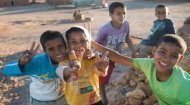|
Western Sahara Profile |
Western Sahara Profile |
Western Sahara Profile | Western Sahara Profile |

|
Conversely, the Polisario Front, supported primarily by Algeria, continues to advocate for a full self-determination referendum, including the option of independence. It governs the remaining 20% of the territory east of Morocco's berm, often referred to as the "Free Zone," which is largely uninhabited desert. More significantly, the Polisario Front maintains administrative control over the Sahrawi refugee camps in Tindouf, Algeria, where tens of thousands of Sahrawis have lived for generations, relying on international aid. The SADR, though a government in exile, is recognised by several dozen states, primarily in Africa and Latin America, and is a full member of the African Union. This dual claim to governance and legitimacy lies at the heart of the ongoing stalemate. The international community, particularly the United Nations, largely views Western Sahara as a non-self-governing territory, awaiting a political solution that allows for the exercise of self-determination. This unresolved status of Western Sahara has far-reaching implications for regional stability. The dispute directly impacts relations between Morocco and Algeria, two major North African powers whose borders have been closed for decades, impeding economic integration and cooperation in the Maghreb. Algeria's steadfast support for the Polisario Front is viewed by Morocco as hostile interference in its internal affairs, leading to perennial diplomatic tensions. Furthermore, the prolonged conflict creates a vacuum that security analysts worry could be exploited by extremist groups. The vast, ungoverned spaces and the presence of disgruntled populations could potentially become fertile ground for illicit trafficking and radicalisation, further destabilising the fragile Sahel region. The humanitarian situation in the Tindouf refugee camps also presents a challenge to stability, as a generation raised in exile grows increasingly frustrated with the lack of progress and the continuation of their precarious existence. Renewed armed clashes, though currently under a ceasefire, remain a distinct possibility if diplomatic efforts continue to falter. Beyond the political and humanitarian dimensions, Western Sahara holds significant economic potential. Rich in phosphates, a crucial ingredient for fertilisers, and with promising offshore oil and gas prospects, control over the territory's natural resources adds another layer of complexity to the dispute. Morocco has actively pursued economic development in the region, attracting foreign investment, which the Polisario Front views as illegal exploitation of resources from an occupied territory. International efforts, primarily led by the United Nations, aim to find a mutually acceptable political solution. The UN Mission for the Referendum in Western Sahara (MINURSO) has been present since 1991, primarily tasked with monitoring the ceasefire. Successive UN envoys have tried to bridge the chasm between Morocco's autonomy plan and the Polisario's demand for a referendum, but progress has been painstakingly slow. The involvement of key international players, including the United States, France, and Spain, often reflects their own strategic interests and historical ties to the region.
|









